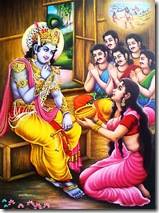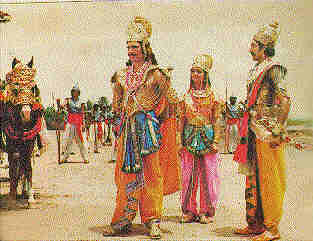


Akshaya TritiiyA



Hence anything done on this day (even material with eventual desire to dovetail in Krishna's service) turns out auspicious.
Candana yatra starts on this day, which is celebrated as well as the day on which treta yuga began. Barley, one of the main ingredients for homa, which is the yuga dharma of Treta Yuga, was also created on this day. Ganga devi also descended to earth on this day. Many common people have special puja on this day. One should bathe in a sacred river, give charity, perform japa and offer barley in a sacred fire, and offer barley preparations to the deity.
Akshaya Tritiya day is the very auspicious day
- there's no inauspiciousness to be found today so even checking muhurthas
is considered unnecessary, so auspicious it is. Whatever one does for devotees,
and for Krsna that person will get more benefit and it is eternal benefit
and never lost.
He said one story of a brahmana: there
was a brahmana who had a very good wife and was poor. Whatever little money
he got would get spent somehow. Also he did not have children. So under
the strong request of his wife he went to Vasishta muni to know the reason
for his suffering. Vasishta muni told him that in his previous life he
was very rich and also had many children. But he was very stingy, he was
not even spending for his own children. This is the reason for his being
poor, also without children. Then that brahmana asked Vasishta muni why
he got a good wife. So that Muni replied that somehow with some reason,
he observed that the vrata of Vaishaka month for the last 5 days. So he
got a good wife and also the brahmana birth. Then the muni advised him
to follow at least the last 7 days left of Vaishaka month, with devotion
to Lord Krsna.
Since that brahmana observed the vrata of Vaishaka month for that at least the left out 7 days, he got sons, he became rich, ultimately he got Love of Godhead and went back to the spiritual world!
It is important to hear such a story/pastimes as this so that at least by hearing this, we engage ourselves in the service of Guru, the Vaishnavas and Krsna. Thus becoming inspired to always render service the devotee is always the beneficiary of such interaction with the Vaishnavas, one's Guru and Lord Sri Krishna.
Akshaya tritiiyaa: (from the Calendar of the Madhwa
Vaishnavas)
The third day in the bright fortnight of vaishaakha is
the day of the incarnation of Lord Vishnu as Parashurama.
The icon is decorated with an axe, to depict Him in a heroic pose.
This coincides with the anniversary of passing of Sri Vijayadhvaja Tiirtha, the sixth piiThaadhipati in the lineage of Sri Pejawar Mutt. He is famous for his commentary upon the Srimad Bhaagavata epic. He lived in the 15th century and his vrindavana (samadhi) is in Kanva Tiirtha. There is also a pipal tree by the side of the vrindavana under which he is believed to have written his commentary.
During the tenure of Sri Pejawar MaTha a special festival is arranged in Sri Krishna Mutt on this day and the akshaya paatra given by Sri Madhva is offered a special puuja. This akshaya patra is said to have been given by the Sun god, it is the same pot that mother Draupadi used to cook in. It is said that from the time of turning it upwards for use on a day the pot will provide unlimited amounts of foodstuffs for the satisfaction of the Lord. There is a story in this connection wherein the angry sage Durvasas came to Draupadi demanding foods:

‘The holy text Madanratna explains how the third day (Tritiya) of the bright half of Vaishakh acquired its name thus.
(Shri Krushna says) O Yudhishthir, the offerings made and the oblations offered in the sacrificial fire (havan) on this day never go in vain. Hence sages have imparted the name Akshay Tritiya to this day. Everything done on this day for the sake of deities and ancestors is permanent.
Akshay Tritiya is one out of the three and a half auspicious occasions (muhurts). This day is significant as according to some it is the beginning of the Krutayug or the Tretayug. Since Indians always consider the first day of any time period to be auspicious, the scriptures prescribe rituals like ritualistic bathing, donations (dan), etc. on such days. The ritual performed on this day encompasses a bath with sacred water, ritualistic worship (puja) of Lord Vishnu, chanting, a sacrificial fire (hom), donations and offerings to ancestors (pitrutarpan). The scriptures recommend a rite for the departed (shraddha) without the use of rice balls (pinga) if feasible, or atleast an offering of sesame seeds. Articles which give protection from the sun like an umbrella, a pair of slippers, etc. should also be given away in charity on this day. This day is also of great significance to women as they are supposed to immerse Chaitragouri (the female deity) worshipped by them in the lunar month of Chaitra. Under that pretext they also perform the ceremony of haldikumkum.’
Significance of 'Akshay Tritiya'
A combination of frequencies of 'Brahma' and 'Shri Vishnu' come from the region of Supreme Deities i.e. 'Sagun-lok' to the Earth due to which the 'sattvikta (pre-dominance of 'Sattva' component)' on the Earth increases by 10%
1. Meaning: If the Deity that bestows constant happiness and prosperity is worshipped on the day of 'Akshay-Tritiya' with the feeling of gratitude, the Deity's grace never wanes. One should worship the Deity with gratitude on 'Aksahy-Tritiya' for acquiring her constant grace.
2. Worship of 'Mrutika (Soil)' : We can acquire 'Dhanya (grains) -Lakshmi', 'Dhana (wealth) -Lakshmi' and 'Vaibhav (glory)- Laksmi' due to 'Mrutika (soil)' who always bestows her grace. The day of 'Akshay Tritiya' is the day of worshipping 'Mrutika' with gratitude.
3. Make a ditch in the soil and sowing : Akshay Tritiya comes just before the monsoon. There is an intimate relation between the beginning of the rainy season i.e. 'Mrug Nakshatra' and this day. (Intimate relation means a close relation with pure or virtuous purpose.) Fields should be ploughed on the auspicious day of 'Gudhi Padva' and it should be completed by 'Akshay Tritiya'. (Ploughing includes cleaning of the ploughed fields and the layers of soil mixed with fertilizers is to be turned upside down.) On the day of 'Akshay Tritiya', the soil in the fields should be worshipped with gratitude. Thereafter, ditches should be dug in such worshipped soil and seeds should be sown in these channels. If the sowing of seeds is started on the auspicious day of 'Akshay Tritiya', such seeds give a good harvest and there is never a shortage of seeds which results in splendor. (The seeds used are the grains kept aside for future sowing after taking out the grains required for one's consumption.) (In olden days, the rain fall used to be quite heavy. Once it used to start raining, it used to get difficult to make ditches in the wet soil of fertile land and start sowing; therefore, it used to be easier to sow seeds in the cultivated dry land before the onslaught of the monsoon. On the auspicious day Akshay Tritiya, i.e. just before the start of the monsoon, work related to sowing used to be completed. Nowadays, the rain fall is less and sowing is not done as per the science leading to lands becoming infertile and there is decline in the yield.)
4. Planting of trees: It is beleived that one can get an abundant yield of fruits if the ditches in the soil are made on the auspicious day of 'Akshay Tritiya'. Even the medicinal plants /herbs that are sown on the auspicious day of Akshay Tritiya, grow in abundance i.e. there is never a shortage of medicinal plants. - Mrs. Kavita Patil
5. Importance of worshipping the picture of 'Vaibhav-Lakshmi' with Shri Vishnu, on the day of 'Akshay Tritiya' :On the day of 'Akshay Tritiya', a king or those who have the responsibility of taking care of the subjects, should perform 'puja', with gratitude and devotion, of the picture of 'Vaibhav-Lakshmi' with Shri Vishnu as it helps to make the subjects happy and prosperous. We are not graced by Goddess Lakshmi as she is the Divine energy (shakti) of Shri Vishnu. How can His Divine energy come here and bless us if Shri Vishnu is not invited? Therefore, before worshipping Shri Lakshmi in any of her forms, first invite Shri Vishnu and then invite Shri Lakshmi as the worshipper gets maximum benefit of Lakshmi-tattva (Principle) - Mrs. Kavita Patil
Seeker's Debts towards God and ancestors reduce to some extent when he does 'Til Tarpan' (offering of sesame and water) to Deities and ancestors. Due to the transmission of 'sattvikta (Pre-dominance of 'Sattva' component)' on the day of Akshay Tritiya, one feels good to the extent of 60 to 70 % and distress felt due to ancestors is 30-40%; therefore, 'Til Tarpan' on Akshay Tritiya helps to reduce the seeker's debt towards God and ancestors to a certain extent. When a seeker does 'Til Tarpan' sincerely, honestly and with 'bhav', Deities and ancestors become pleased with him and bless him for his spiritual progress and reduce his problems. - A seeker
Importance of making offerings on Akshay Tritiya
When an offering is made to a deserving person, the benefit is spiritual progress and going to a higher region instead of heaven: Making offerings is a virtuous act. The offering made on Akshay Tritiya never wanes; in fact, one gets more benefit out of the offering made on Akshay Tritiya. As lots of virtues are gained by the seeker, sins committed by him in his previous births reduce and his virtues increase. This can help the 'jeeva (embodied soul)' to attain heaven; but a seeker does not want to go to heaven by gaining virtues as his goal is to attain God. A seeker should, therefore, make an offering to a deserving person (Satpaatre Daan). Here, 'satpaatre daan' means to make an offering to such activities involving not only spiritual propagation but also activities towards the protection of the Nation and Dharma. Offering to a deserving person will accrue no virtue for the donor but the offering will become 'Akarma karma (non action, without any doership)' leading to his spiritual progress. Thus, a seeker will go to a higher 'loka (region)' due to his spiritual progress. - A seeker
'Til Tarpan', meaning in the context of worldly matters and spiritual meaning
A. 'Til tarpan' means to offer sesame and water to the Deities and ancestors. Sesame is a symbol of 'Sattvikata' whereas 'jal (water)' is the symbol of pure 'bhav (spiritual emotion)'.
B. Make an offering of 'Til Tarpan' means to offer to the Deities the 'bhav' of gratitude and surrender in the form of sesame (til) God has everything so what can we offer to Him ? There should also be no ego (aham) that 'I am offering something to God.' While offering 'til', have the 'bhav' that 'God is getting everything done from me' as it will not increase the ego of a seeker but will increase his 'bhav'. To offer 'Til Tarpan' means to offer the 'bhav' of gratitude and surrender to God in the form of sesame.
C. Deities
C. 1. Method: First invite the Deities. Take a plate of copper or brass or of any 'sattvik' metal. Remember Brahma and Shri Vishnu or their joint form i.e. Lord Datta and invite them to come in that plate. Thereafter, have the 'bhav' that the Deities have come there through the 'Subtle' form. Hold 'til' in your hand with the 'bhav' that the principles of Shri Vishnu and Brahma are there in the sesame. Then have the 'bhav' that an offering of sesame is made at the feet of the Deities.
C. 2. Effect : First as 'tils' are offered (at the feet of the Deities who have arrived in the Subtle form), the 'Sattvikta' in 'til' transmitted from the Deities is absorbed to a great extent and with the offering of water, 'bhav' of the person making such an offering gets awakened. As his 'bhav' is awakened, he is able to imbibe more 'sattvikta' which has been absorbed in the 'til' from the Deities. This shows that God is yearning for the 'bhav' of a seeker. When 'bhav' and ego are offered to God, He generously bestows His grace.
D. Ancestors
D. 1. Importance : 'Sattvikta' comes from the higher 'lokas (regions)' on the day of Akshay Tritiya. Many 'jivas' come near the Earth from 'Bhuvloka' to imbibe that 'sattvikta'. Most of these 'jivas' are ancestors of human beings. As the ancestors come near the Earth, it is possible that a human being can have more distress on the day of 'Akshay Tritiya'. A human being is indebted to his ancestors. God expects that a human being should try to repay this debt; therefore, 'Til Tarpan' has to be offered on the day of Akshay Tritiya so that the ancestors' journey after death becomes smooth.
D. 2. Method (Have the 'bhav' that the ancestors have come through subtle and we are offering 'til' and water charged with the principles of Deities at their feet.): In the other plate, we have to invite our ancestors. Before offering such 'til' and water, a prayer is to be made to the Deities inviting their respective principles to be charged in the 'til'. Have the 'bhav' that 'the ancestors have come through the 'subtle' and we are offering 'til' and water at their feet. After 2 minutes, offer the 'til' and water charged with the principles of the Deities to the ancestors. Hold the 'til' that have become 'Sattvik' in your hand and pour water slowly in the plate along with a prayer to Datta or Brahma or Shri Vishnu for making the ancestors' further journey smooth.
D. 3. Effect: 'Sattvikta' in the subtle bodies of the ancestors increase
due to 'Til Tarpan' and they get energy to travel to the higher 'loka (region)';
Distress of a human being due to ancestors is reduced by 5 to 10 %. 'Til'
has the ability to absorb 'Sattvikta' and destroy 'Raja-Tama'. The black
covering on the symbolic subtle bodies of ancestors, who have come to the
plate through the subtle, is removed, depending on the 'bhav' of the seeker
doing 'Til Tarpan' and the 'sattvikta' in their subtle bodies increases
which give them necessary energy to go to the higher 'loka'. By offereing
'til' to Deities, a seeker first gets 'sattvikta' and if his 'bhav' is
more than 40%, God creates a protective cover around him through the subtle.
Thus, the seeker does not face any distress while doing 'Til Tarpan'. Distress
due to an ancestor faced by a seeker reduces to the extent of 5-10 % by
'Til Tarpan'. - A seeker
